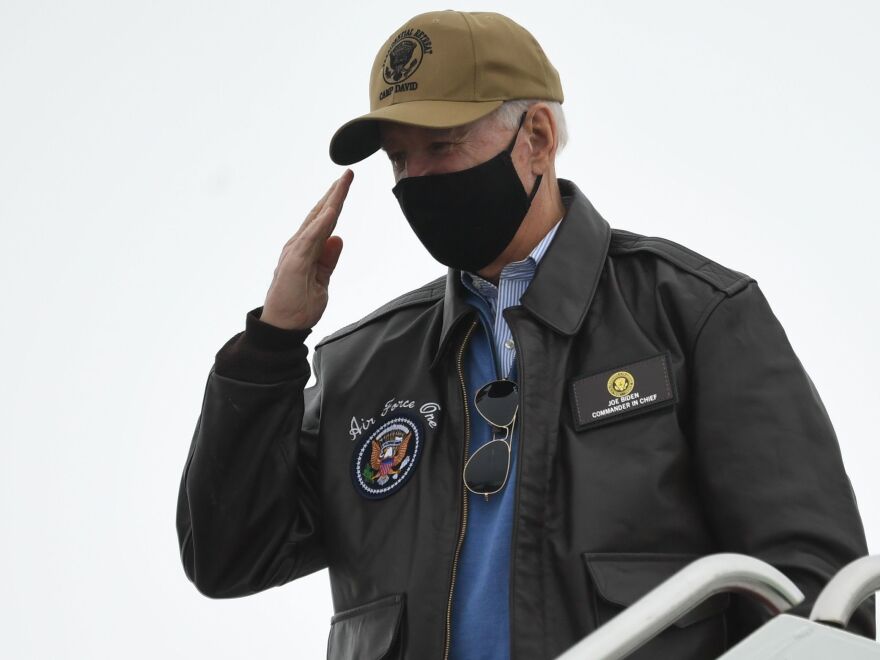Like the many Americans who have stuck close to home during the pandemic, President Joe Biden limited his time traveling around the United States this year, breaking with his recent predecessors who all hit the road more frequently during their first years in office.
All told, according to an NPR analysis of the president's official travel, Biden spent 42 days holding events beyond the borders of Washington D.C., Maryland and Virginia, and the most common destination was the place where he was born — Pennsylvania. Biden visited the state seven times since he took the oath of office. No other recent president, dating back to Jimmy Carter, has traveled there as often in his first year, according to data compiled by U.S. Naval Academy political science professor Brendan Doherty.
Loading...
"Presidents travel for a wide range of reasons," said Doherty, who has tracked presidential travel for a book he's written. "They are sometimes trying to advance their own reelection interests, traveling to key swing states. Sometimes, they're raising campaign funds — although Biden has been doing that virtually."
Biden's travel appears to be a mix of electoral calculations ahead of the 2022 midterm elections, traditional presidential duties to comfort Americans after natural disasters, and a personal desire to elevate priorities that are more difficult to alter legislatively, such as racial justice.
And, so, for example, the Democratic president visited Oklahoma, a solidly Republican state, in June to mark the 100th anniversary of the Tulsa race massacre.

Doherty says presidents often take trips to promote a policy agenda and build support for specific pieces of legislation in Congress, as well.
Biden has visited a vaccine manufacturing site, automobile plants, union training centers, and even a rusted old bridge to sell, first, his COVID relief bill, then his infrastructure plan, and, more recently, his so-called Build Back Better Agenda.
Pennsylvania checked a lot of boxes for him. So did Michigan.
After Pennsylvania, not accounting for Maryland and Virginia which are home to a number of federal agencies that presidents of both parties often visit, Michigan was the next most-frequently visited state for Biden. He made trips there five times in 2021.
Visiting election battlegrounds
Like Pennsylvania, Michigan is increasingly a battleground in presidential elections, and part of the Democrats' so-called "blue wall." Both were key to Biden's victory, and both are expected to have competitive senator and/or gubernatorial elections next year.

Both Republican and Democratic presidents tend to visit battleground states more than other places.
But Biden has focused on the traditional Democratic map across the Midwest and northeast, rather than the demographically-shifting south. He's been to Ohio three times, although he lost the state, and by most political analysts' assessment Ohio is increasingly Republican turf in presidential elections. He's only been to Florida once, after the collapse of the Surfside condo building. And he's never gone to Arizona - a state he narrowly won.
The White House points to proximity as a factor. Biden has only been west of the Rocky Mountains once. Former presidents Barack Obama, George W. Bush, and Bill Clinton had all held multiple days of events in California by this point in their presidency.
Loading...
Bush: a master of travel as strategy
Presidents and their staffs tend to be believe they can influence public debate with a presidential visit; it's part of the communications strategy.
Doherty says former President George W. Bush's team was particularly disciplined with its travel and message focus.
"[Bush] would often declare a week to be say - education week. And then would travel around the country have three or four events in different cities where all he talked about was education," said Doherty.
This was intentional, according to Ari Fleischer, the White House press secretary at the time.
"The first 6 months was very aggressive in going to Democratic senator states and having gigantic tax rallies to encourage them to vote for the Bush tax cuts of 2001," he said, pointing out that a number of the trips targeted states Bush had won that continued to have Democratic senators. "And he would call on Senator Breaux from Louisiana to join me and the crowd would roar, sending a signal that, you're the senator, you're the Democrat, but your people are for me."
For the Bush White House, a presidential visit in a strategic state was a tool the president and his team leveraged on Capitol Hill to pass legislation. But that was a different era, and while travel remains useful, Fleischer himself wonders if it is as effective nowadays as it was 20 years ago when he worked in the White House.
"Travel used to be one of the president's strongest tools, back when there were fewer media, pre-internet, and then all of a sudden a president comes to town and it is massive news for days," he said.

Some Presidents could find it more useful to stay in Washington and work the phones. Ultimately, Fleischer says legislative wins increase a president's popularity more than a random trip to generate positive local news coverage.
In November, Biden signed the $1 trillion bipartisan infrastructure bill into law, but his other signature initiative - the Build Back Better bill to expand the social safety net and battle climate change - is on life support after West Virginia Senator Joe Manchin, a key vote, said he could not support it.
A White House official says Biden is expected to hit the road more often in 2022, ahead of the midterms.
Though that could become politically tricky — it's not necessarily helpful for politicians to campaign in places where they're unpopular.
And - at the moment - the president's approval rating is underwater, and he appears unpopular even in states that he won.
Copyright 2021 NPR. To see more, visit https://www.npr.org.




